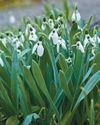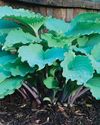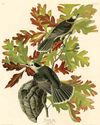
What shrub would you recommend for structure in the garden? Some of us might suggest boxwood (Buxus), and for good reason. These popular evergreens have been cultivated for thousands of years, beginning with the Egyptians and continuing into the 21st century. However, for more than a decade now a fungal disease called boxwood blight has been spreading across the United States, causing the loss of many boxwood plants and forcing gardeners to look for alternatives to use in the landscape.
Fortunately, we have access to a wide range of plants that can fill this void, including a few boxwood varieties that are resistant to the disease. Let's check out some plants that can be used like boxwood while providing additional benefits in the garden. Many of these picks are for warmer climates, but some also work in the North.
DISTYLIUM
Hardy in USDA Zones 7 through 9, cultivars of Distylium have quickly emerged as a durable evergreen replacement for disease-prone shrubs in warmer parts of the country. And that's no surprise when you hear about distylium's many features, like shade and drought tolerance, deer resistance, design versatility and beautiful dark green foliage.
In this genus, you'll find several varieties well suited to filling large or small parts of the garden. One example is First Editions Cinnamon Girl (D. 'PIIDIST-V'), shown above, which has plum-purple new growth that becomes blue-green as the leaves mature. With a rounded spreading habit, it's a beautiful addition to landscapes in warm regions.
BAYBERRY
This story is from the July - August 2024 edition of Horticulture.
Start your 7-day Magzter GOLD free trial to access thousands of curated premium stories, and 9,000+ magazines and newspapers.
Already a subscriber ? Sign In
This story is from the July - August 2024 edition of Horticulture.
Start your 7-day Magzter GOLD free trial to access thousands of curated premium stories, and 9,000+ magazines and newspapers.
Already a subscriber? Sign In

Pot It Up
Shake up the containergarden with theseNorth America –native perennials

THE GARDEN PATH TO PERDITION
I WAS CRUISING RIGHT ALONG, feeling okay about myself, when I came across a list of the Seven Deadly Sins.

A Productive PATIO
Tiny fruit, vegetable and herb plants help gardeners maximize any sort of growing space

TROPICAL FUSION
A FUSS-FREE APPROACH TO USING BOLD TROPICAL PLANTS IN ANY TEMPERATE GARDEN

WINTER READING
Pass the time with any of these inspiring books

SENSING A PATTERN
Greg Coppa reflects on an odd weather year and what continued warming may mean for his Rhode Island garden

TOP-PRIZE PERENNIALS
A foliage masterpiece for shade and a late bloomer for sun

MARK WESSEL
What's new for fruit and vegetable gardeners?

KINGS OF THE NORTHERN FORESTS
A look at the trees, shrubs and perennial plants that bolster life in Ecoregion 5

PROJECT FEEDERWATCH
Gardeners can help scientists know just where the birds are in winter